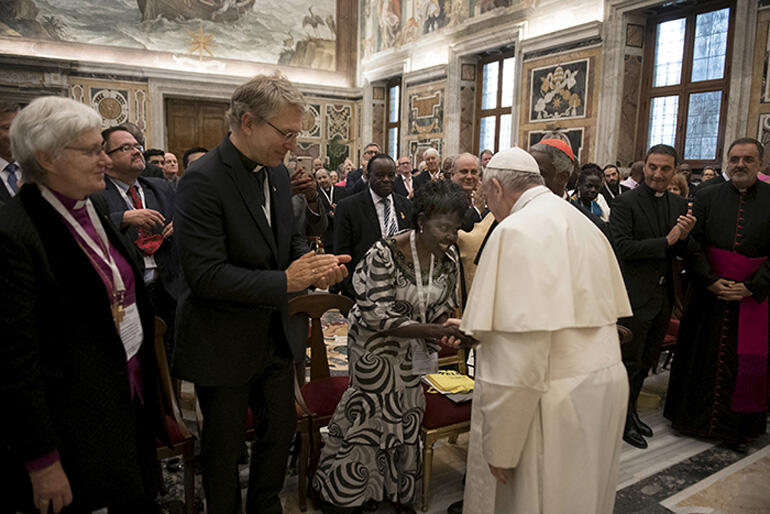
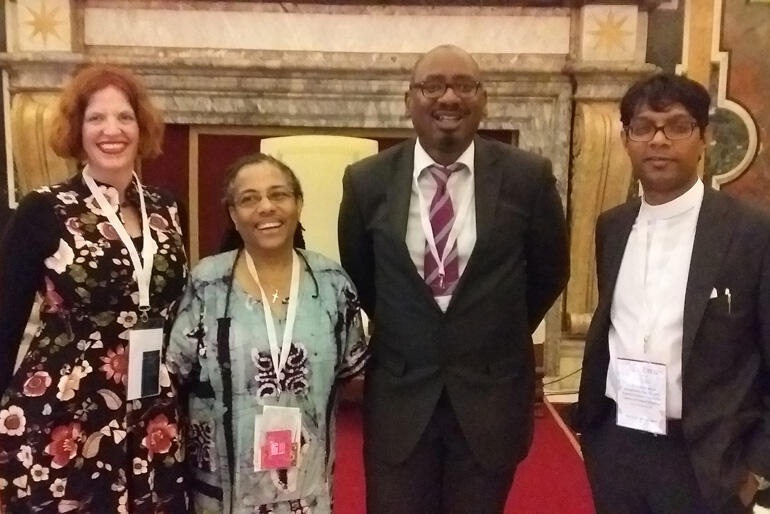
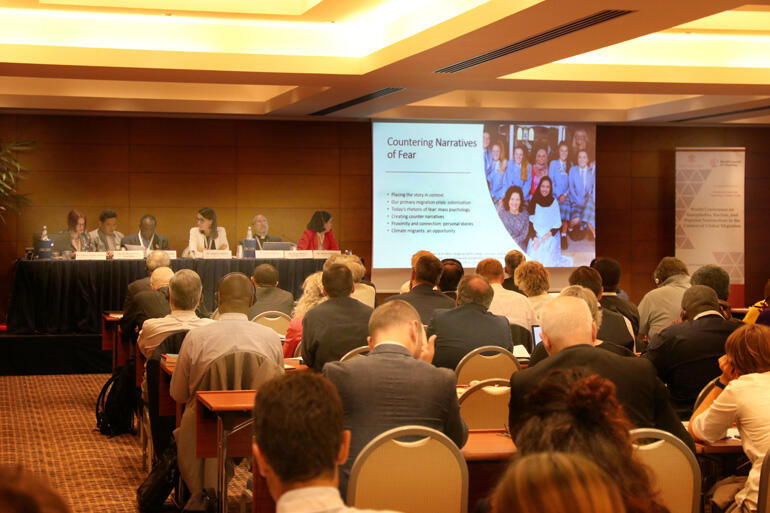
Anglicans attending a joint World Council of Churches (WCC) and Vatican conference in Rome have spoken out on the need to counter xenophobia and racism towards refugees and migrants. Anglican experts were called to the World Conference on Xenophobia, Racism and Populist Nationalism in the Context of Global Migration, which took place in Rome from 18 to 20 September, co-sponsored by Vatican Dicastery for Promoting Integral Human Development and the WCC, with the support of the Pontifical Council for Promoting Christian Unity.
Dr Agnes Aboum from the Anglican Church in Kenya, who was at the conference in her role as Moderator of WCC Central Committee, was joined by 200 global and regional experts on refugee and migrant issues as well as ecumenical, religious and civil society change-makers. She said the conference recognised the gravity of unchecked xenophobic rhetoric and hate-inspired violence around the globe.
“The problem of populist nationalism inciting negative and violent responses to refugees and migrants appears in some way, everywhere,” she said. “It threatens communities both in countries of reception and countries of origin.”
According to Dr Aboum, the Anglican Communion must heed the message of this week’s conference and take action to counter racism and xenophobia in the countries of the Communion, as well as focusing on activities that can hold Anglicans together to counter the problem from all sides.
At an audience with Pope Francis at the Vatican on the final day of the conference, the pontiff commended the conference as a welcome sign of renewed cooperation between churches on issues of justice and human wellbeing and encouraged more such collaborations in the future.
“Faced with the spread of new forms of xenophobia and racism, leaders of all religions also have an important mission: to spread among their faithful the principles and ethical values inscribed by God in the heart of man known as the natural law,” he said to the assembled conference at the Vatican reception on 20 September.
The three-day programme in Rome brought together refugee voices and experts from legal, policymaking and pastoral fields from across the globe.
Representatives of United Nations bodies spoke on the state of refugee and migrants’ rights, highlighting the social impact of major movements in Africa and the Middle East, as well as the political responses to refugees in Europe. Speakers included representatives from UNICEF, the UN Alliance of Civilizations, and the Office of the High Commissioner on Human Rights. Inter-governmental bodies such the African Union and Council of Europe also contributed their perspectives on both causes and ways to mitigate anti-immigrant attacks.
Presenters set out to identify and shift the attitudes and political circumstances that lead to populist nationalism and xenophobia, including inequality within nations, and emphasised the power of civil society, the media, academia, religious and ecumenical leadership to advocate for peace and equality between nationals and immigrants.
The UN Special Rapporteur on the Rights of Minorities, Professor Fernand Varennes told the conference that bigotry and xenophobia against refugees and migrants are not yet the new normal – but that it looks not far over the horizon. He noted a worrying increase in nation states that “do not even pay lip service to international human rights law,” but instead show open contempt for the rights of migrants.”
Prof Varennes encouraged the world’s churches to monitor and advocate for the inalienable rights of migrants, asylum seekers and refugees as enshrined in the Universal Declaration of Human Rights which celebrates its 70th anniversary in 2018, and in the recently agreed Global Compacts for Safe, Orderly and Regular Migration and on Refugees. He called on churches to hold states to account whenever politicians push policies that disrespect human rights and urged churches to reinforce and build on the commitments already made by their governments.
Church of England experts at the conference included USPG’s theological adviser on global relations, Dr Evie Vernon O’Brien, who also represented the Pan African Women’s Ecumenical Empowerment Network, and Richard Reddie from Christian Aid.
Evie Vernon O’Brien believes the churches in England, Ireland, Scotland and Wales need to keep issues of racial justice high on their agenda. “These issues are very current in the UK, with rising signs of populist nationalism, and also Islamophobia,” she said. “We can see a lot of scaremongering, and cases where churches have not only failed to act against racism, but bought into that racism themselves.
“None of the scaremongering tactics can be proven with evidence, so we are dealing with a matter of perception. Stokers of fears against migrants which picture them as takers and locals as losing out, are based on lies.”
Richard Reddie highlighted the conference’s emphasis on scripture which can be used as either a basis for “insider versus outsider” mentality, or to emphasise Jesus’ command to welcome the stranger. He added that for the Church of England, the claim that migrants make a contribution to their receiving communities comes very close to home.
“In almost every place where the Church of England is growing, it is growing thanks to Black and immigrant Anglicans,” he said.
Traci Blackmon from the United Church of Christ USA named the foundations of anti-black and brown racism in current US anti-immigrant policies, which she said are congruent with the US history of racism that is “both systematic and systemic.”
“When President Trump closed the refugee programme it was not designed to stop border crossing from the north. It was focused on the south, where migrants are most likely to be poor and have non-white skin,” she told the conference.
Blackmon went on to name the importance of racist and anti-immigrant political hate speech to build conditions which enable longer-term residents of nations to justify harsh and unjust treatment of newcomers: “Propaganda is essential to lead people to act inhumanely. It is always easier to oppress people that we detest.”
Dr Peniel Rajkumar, a priest from the Church of South India and interfaith scholar who serves as WCC Programme Executive for Interreligious Dialogue and Cooperation, invited experts from different religious traditions the conference. Speakers from Hindu, Muslim, and Buddhist traditions pointed to core doctrines from their traditions that can lead the faithful away from fear of the stranger.
Katsutoshi Mizumo from Japan spoke on the Buddhist call to compassion; Prof Anantanand Rambachan elaborated the Hindu belief in the presence of God in all persons regardless of age, gender or ethnicity; and Dr Aref Nayed described Islam as a “migratory religion” where all people are strangers seeking to be led by God in God’s way, adding that “all Muslims who abuse migrants, abuse Islam.”
Religious communities, including Saint Egidio, Focolare and Taizé spoke on their work with refugees and migrants, giving insights into the personal stories of individual refugees and their struggles to come to terms with the new cultural world they find themselves in when arriving in Europe. Several speakers raised the issue of racism as one of the building blocks of colonisation and the large-scale disenfranchisement of indigenous peoples, coming through particularly strongly in regional reporting from the continents of Africa, Asia, the Pacific and the Americas.
Finally, media practitioners from the World Association of Christian Communication and church and secular media experts from six global regions presented ways to utilise media platforms to counter the narratives of fear underpinning xenophobic thought and action.
- The message from the World Conference Xenophobia, Racism and Populist Nationalism in the Context of Global Migration is available in English, Spanish and French.
- The full text of Pope Francis’ remarks is available here.
- Julanne Clarke-Morris from the provincial media office of the Anglican Church of Aotearoa, New Zealand and Polynesia, gave a presentation at the conference.







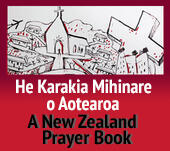
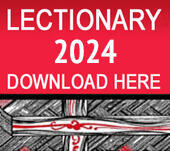

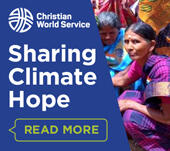
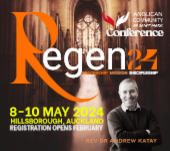
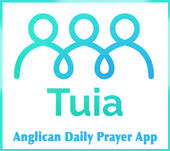

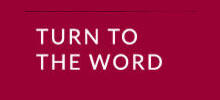


Comments
Ronnie Smith
Tuesday 02 October 2018 11:00:40 am
Log in or create a user account to comment.